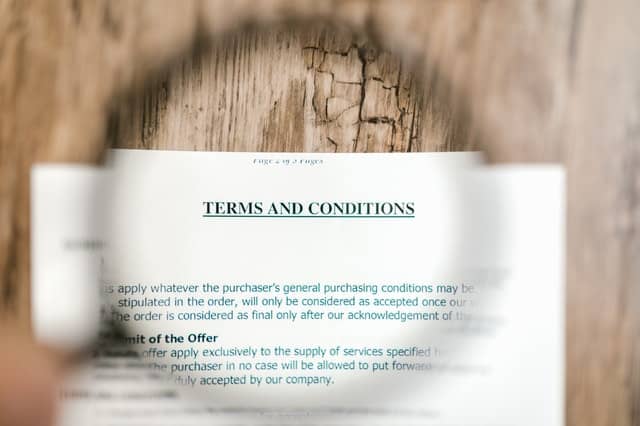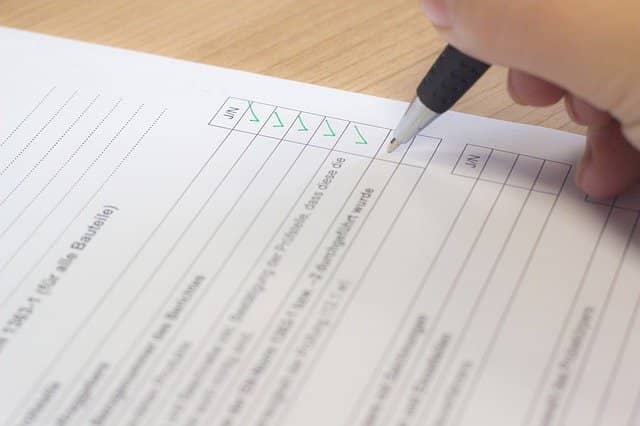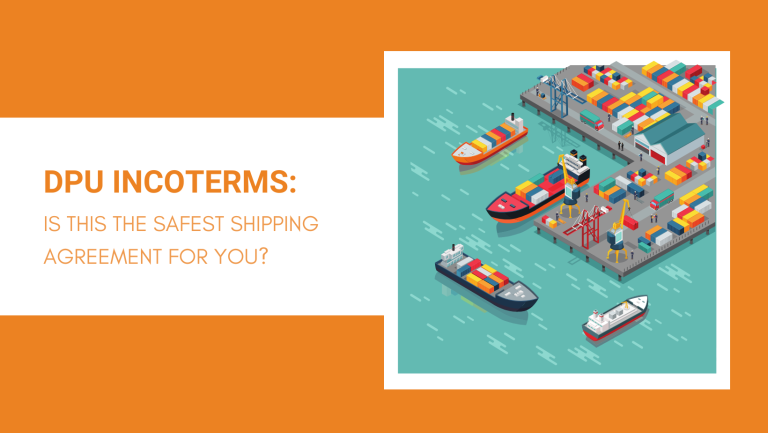Shipping contracts in international trade can get confusing for a few people. Without having a proper agreement between a buyer and a seller, it can be difficult to identify the responsibility and risk on both parties.
That is why Incoterms are in place. They help categorize the obligations, risks, and costs of the sellers and buyers by selecting one out of eleven shipping Incoterms including DPU.
This article explains everything regarding DPU Incoterms, what they mean, and what responsibilities these Incoterms put on the buyers and sellers.
By the end of this article, you will learn about every useful information regarding a DPU agreement.
Let’s start.
What Does DPU Stand For?
DPU stands for “Delivered at Place Unloaded”.
This is an acronym used in the shipping industry which means that the seller is responsible for delivering the goods at the place decided by the buyer and is also responsible for unloading the goods at that place.
What Are DPU Incoterms?
The DPU Incoterms are the rules or terms and conditions chalked by the International Chamber of Commerce (ICC) to set the clear responsibilities of sellers and buyers who sign a DPU agreement.

The DPU Incoterms were previously called DAT (Delivered at Terminal) Incoterms.
That is because it had the same meaning and responsibilities but according to the Incoterms 2020, the DAT is no longer used and is replaced by the DPU Incoterms.
Importance of DPU Incoterms
The DPU Incoterms play a very important role in closing a shipping agreement. Just like other Incoterms, a DPU agreement applies to international trade or export and import contracts.
These rules settle any potential disputes between a buyer and seller because they already define the roles and responsibilities of both parties in a shipping contract.

These rules set clear expectations of a buyer from a seller so that there may be no clashes in the future. The seller will be responsible and accountable for the steps parked with him and the rest of the steps have to be taken care of by the buyer.
But, what are the roles and responsibilities of sellers and buyers who sign a DPU agreement?
Let’s find out in the following section.
Responsibilities of Sellers and Buyers in a DPU Agreement
Let’s explore what the sellers and buyers are supposed to do in a DPU agreement.

Responsibilities of a Seller in DPU Incoterms
Following are the responsibilities of a seller in a DPU agreement.
- Arranging the goods as per the details and specifications shared by the buyer.
- Sharing the formal bill or invoice of the goods with the buyer.
- Preparing and sharing the required documentation of goods and the shipping agreement.
- Packing the goods to make them eligible for export.
- Marking the goods properly as per export or shipping SOPs.
- Managing export duties and taxes at the port.
- Fulfilling all the export formalities and clearing the goods from customs at the port of origin country.
- Clearing the goods at pre-shipment inspection.
- Loading the goods from the seller’s warehouse and delivering them to the port of origin country.
- Paying for the loading charges at the port for export.
- Arranging for the main carriage.
- Delivering the goods at the place nominated by the buyer in the destination country.
- Arranging for unloading of goods at the destination country.
- Sharing the proof of delivery at the named place of destination.
All of the above-mentioned duties are to be fulfilled by the seller according to the DPU Incoterms.
Now, let’s find out what a buyer has to do in this agreement.
Responsibilities of a Buyer in DPU Incoterms
Once the goods are delivered and unloaded at the named place of destination, the buyer has nothing much left to do to close the shipping deal.
Still, the roles and responsibilities of a buyer as per the terms and conditions set under DPU Incoterms are as follows.
- Making the payment for goods as per the commercial bill or invoice.
- Clearing the goods from customs at the destination port.
- Performing all the import standard procedures.
- Clearing the shipment from inspection at the destination port.
- Taking care of other import formalities.
- Arranging for the onward carriage from the port in the destination country.
- Moving goods from the named place of destination to the buyer’s final destination. (e.g. buyer’s warehouse or other business location).
Now that we have clearly understood the buyer and seller responsibilities in the DPU agreement, let us discuss the costs in this agreement.
The Costs of Sellers and Buyers in DPU Incoterms
The cost of shipment is probably the most important aspect of any shipping agreement. Let’s define who will be responsible to pay for different steps involved in a DPU agreement.

The Costs of Sellers in DPU Incoterms
You must have got an idea of the costs that a seller has to bear while you read the seller’s responsibilities. But to be clear, let us find out what costs a seller has to pay for in a DPU contract.
- The costs involved in packing and doing the proper marking of goods.
- The costs of delivering the goods from the seller’s warehouse to the port in the destination country.
- The costs of pre-shipment inspection at the port before export.
- Paying for the customs duties and taxes, etc at the port of origin country.
- Paying for the arrangements for unloading the goods at the place decided by the buyer in the destination country.
Costs of a Buyer in DPU Incoterms
- Main payment according to the seller’s invoice or bill for purchasing goods from the seller.
- Paying for the customs duties and taxes at the destination port.
- Paying for any other import clearance charges including the value-added tax (VAT).
- Shipment inspection charges at the destination country.
- Paying for the onward freight to the buyer’s warehouse.
As you can see from the costs of both parties, the seller is paying for the costs of more steps in this DPU shipping agreement as compared to the buyer.
Let’s analyze the pros and cons of DPU Incoterms for both sellers and buyers in DPU contracts.
Pros and Cons of DPU Incoterms
Just like the costs and responsibilities, we will discuss the pros and cons of DPU agreements for buyers and sellers separately.
Pros of DPU Incoterms for the Seller
Although the seller is doing more shipping steps in this agreement, he also enjoys many pros by doing so. They are mentioned below.
- More shipping steps give sellers more room for profit margins against each step.
- Most of the seller’s responsibilities are in their own country. So, the sellers are comfortable in doing them as they are already experienced with these practices.
- Sellers can utilize their own freight for delivering goods at the port for export to save money.
- The sellers don’t have to get involved in customs formalities at the destination port.
- Very little interaction is required from the seller in the destination country.
Cons of DPU Incoterms for the Seller
- More shipping steps mean the sellers may have to confront greater risks of damages and losses.
- Unloading at the named place destination can be an added hassle for the sellers especially if the seller is unfamiliar with the buyer’s premises.
Pros of DPU Incoterms for the Buyer
The buyer also enjoys multiple pros or benefits by having a DPU contract. They are mentioned below.
- The buyer is responsible for fewer shipping steps in a DPU agreement which gives them peace of mind, especially for the new buyers.
- Getting the goods cleared from import themselves may be cheaper than asking the seller to do it for you.
- The buyer can save money in arranging his network of cargo for onward carriage.
- Buyers can claim for any damages from the seller’s warehouse to the unloading at the named place of destination.
- Fewer shipping steps mean more time saving and a greater balance between time, cost, and quality of service.

Cons of DPU Incoterms for the Buyer
There are a few cons associated with the DPU Incoterms that a buyer may have to face. They are listed below.
- Putting more shipping steps on the seller would make the overall shipping deal more expensive.
- Less control over the goods especially in the country of origin.
The Risks Involved in DPU Incoterms
Let us discuss how much the sellers and buyers are at risk in DPU agreements.
Risks for Sellers in DPU
As discussed earlier, the seller has to face a higher risk in a DPU agreement. Following are the risk factors involved for the seller in DPU contracts.
- The goods may get damaged while loading at the seller’s warehouse and transporting them to the port of origin country.
- The risk of customs delays at the port of origin country.
- Any delays in the main carriage may bring extra costs and hassle for the sellers.
- Sudden price hikes in freight and carriage after the deal has been signed.
- The damages and loss of goods while unloading at the named place of destination.
Risks for Buyers in DPU
The buyers may have to face the following risks in a DPU agreement.
- Any natural delays at the port of the destination country.
- The sudden tax increase on imported goods such as VAT, etc.
- Any price hikes in the freight and cargo in the destination country after signing the deal.
- The loss and damage of goods during the onward carriage.
So, it is visible that the risk of loss and damage is very little on the buyer in DPU Incoterms. The seller bears all risks until the goods are delivered to the desired place of the buyer.
Tips to Use DPU Incoterms in Your Favor
As a buyer, all you would need is to import your required goods at the cheapest costs. The other aspect that you might be concerned about is the speedy shipment.
You can consider the following tips if you want to use the DPU Incoterms in your favor.

- Make a detailed analysis of getting your products delivered at your place from a variety of sources including a sourcing agent.
- Make a price comparison of the overall costs of getting your goods at your desired location from multiple sellers.
- Try to calculate the costs of overall shipment deals by using different Incoterms.
- Try to reduce as many seller’s responsibilities as you can. But only do this if you can handle the rest of the responsibilities yourself. In the case of a DPU agreement, most of the responsibilities are on the seller.
- Contact most of the freight and cargo services in your country for onward carriage.
- Analyze and negotiate the prices from cargo services and sign the deal before there are any surprises.
- Try to have sufficient knowledge of customs formalities at the port of the destination country.
- Agree on the date of delivery with the seller so that there are no delays in your shipment.
- Have a constant follow-up with the seller regarding your order and ask for the current status of your goods.
- Carefully specify the named place of delivery and unloading. If that place is near to your warehouse, you can save on onward carriage.
FAQs on DPU Incoterms
We have answered the frequently asked questions regarding DPU Incoterms in the following section. Read the answers carefully. They will further clarify your concepts about DPU agreements.
What Is the Preferred Mode of Transport in DPU Incoterms?
The DPU Incoterms apply to any mode of transport. There is no special instruction or recommendation from the ICC for using DPU agreements.
So, you can go for a DPU agreement for any of the modes of transport. They include air, road, rail, and sea.

What Is the Difference Between DAP and DPU?
The DAP stands for “Delivered at Place”. The DAP Incoterms are very close to the DPU Incoterms with one basic difference. In DAP Incoterms, the seller is not responsible for unloading the goods while unloading is the seller’s responsibility in the DPU agreement.
The rest of the responsibilities are the same in both DAP And DAP Incoterms. The buyer is responsible for import customs clearance and onward carriage in both Incoterms. Both are used in shipping contracts according to the buyer’s needs.
What Is the Difference between DPU and DDP Incoterms?
DDP Stands for “Delivered Duty Paid”. According to DDP Incoterms, the seller is responsible for delivering the goods at the place of destination as specified by the buyer and is also responsible to pay for the import duties and taxes.
The DDP agreement is the kind of shipping contract in which the buyer is at minimum risk and is only responsible for unloading the goods at the desired place of destination to receive the goods.
Is DDU the Same as DPU?
No. The DDU is not the same as DPU. The DDU stands for “Delivered Duty Unpaid”. This is an old name that was used in the shipping contracts.
In DDU contracts, the seller was not obligated to unload the goods while unloading is the seller’s responsibility in the DPU Incoterms. So, the unloading is the basic difference between these two shipping contracts.
DDU puts responsibilities on the seller to deliver the goods at the named place of destination without paying for the duties.
The import duties are also not paid by the seller in DPU Incoterms but the seller’s additional responsibility of unloading the goods at the destination makes DPU different from DDU.
So, we can say that the DDU is more like DAP Incoterms. Rather, the erstwhile DDU Incoterms have been replaced by DAP (Delivered At Place) Incoterms in ICC Incoterms 2020.
Who Pays for Insurance in DPU Incoterms?
According to the DPU Incoterms 2020 framed by the ICC, there is no obligation on the seller or a buyer to have the insurance of goods. So, both parties are not obligated to insure the goods by contract or by rules.
However, if the seller or the buyer wants to insure the goods on their behalf, they can do so. But as the insurance is not part of this contract, they have to bear the insurance charges on their own.
Final Words
There are many steps involved in getting your shipment delivered to your desired place of destination. The eleven ICC Incoterms make it easier for you to choose the right shipping contract for you.
The DPU Incoterms provide one of the safest options to source products from any other country but at the same time, this shipping contract may also be the most expensive one due to maximum seller responsibilities.
For product sourcing, it’s best to work with an expert sourcing company like NicheSources since they offer convenient shipping options for you. You can ask for a free quote today if you want to source products from China and our representative will be right there to assist you with everything.

